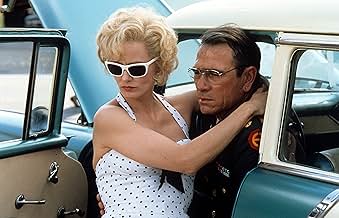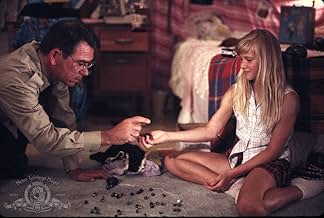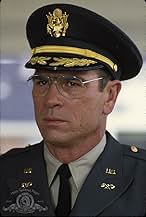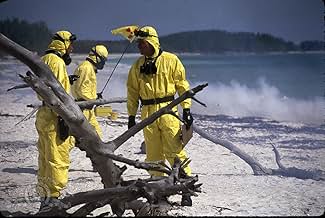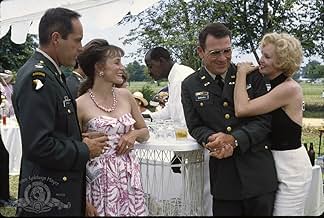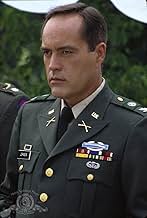Blue Sky
- 1994
- Tous publics
- 1h 41m
IMDb RATING
6.4/10
8.7K
YOUR RATING
Carly moves with her military husband and their two daughters to an isolated army base, only to quickly become part of a cover-up involving nuclear bomb tests.Carly moves with her military husband and their two daughters to an isolated army base, only to quickly become part of a cover-up involving nuclear bomb tests.Carly moves with her military husband and their two daughters to an isolated army base, only to quickly become part of a cover-up involving nuclear bomb tests.
- Won 1 Oscar
- 4 wins & 5 nominations total
Timothy Scott
- Ned Owens
- (as Tim Scott)
Featured reviews
Just as Shohei Ohtani cannot, by himself, take the Anaheim Angels to baseball greatness neither can Jessica Lange lift this film into the realm of goodness. Tony Richardson's last movie remains, after twenty nine years and despite Ms. Lange's powerful performance, a decent but flawed work.
The flaws, of course, can mostly be laid at the word processors of scenarists Rama Laurie Stagner, Arlene Sarner and Jerry Leichting. Not content to tell a simple but moving story of a troubled marriage between a too extroverted, aging Southern belle and a too introverted intellectual, set on an oppressive army base (are there any other kind?) in the South in the early sixties...think "Reflections In A Golden Eye" meets "Woman Under The Influence"...they concoct a truly ludicrous, 1970s, anti government paranoia tale complete with underground nuke tests, fallout, psychiatric incarceration and a kindly, bearded AEC official coming to the rescue (unfortunately, way too late to save the film). And so, by act three, we have left the relatable realm of relationships and recognizable emotions for Hollywood liberalism at its most amok. Or, to put it another way, we've gone from a good, gritty Tony Richardson film to Alan Pakula or Martin Ritt on a bad day.
Bottom line: Richardson shoulda gone out with the kitchen sink, not the paper shredder. Give it a C plus.
PS...Almost as depressing as Richardson's too early demise is seeing the star of "The Last Picture Show", twenty one years after that masterpiece, reduced to a non credited cameo as a cowboy with radiation poisoning.
The flaws, of course, can mostly be laid at the word processors of scenarists Rama Laurie Stagner, Arlene Sarner and Jerry Leichting. Not content to tell a simple but moving story of a troubled marriage between a too extroverted, aging Southern belle and a too introverted intellectual, set on an oppressive army base (are there any other kind?) in the South in the early sixties...think "Reflections In A Golden Eye" meets "Woman Under The Influence"...they concoct a truly ludicrous, 1970s, anti government paranoia tale complete with underground nuke tests, fallout, psychiatric incarceration and a kindly, bearded AEC official coming to the rescue (unfortunately, way too late to save the film). And so, by act three, we have left the relatable realm of relationships and recognizable emotions for Hollywood liberalism at its most amok. Or, to put it another way, we've gone from a good, gritty Tony Richardson film to Alan Pakula or Martin Ritt on a bad day.
Bottom line: Richardson shoulda gone out with the kitchen sink, not the paper shredder. Give it a C plus.
PS...Almost as depressing as Richardson's too early demise is seeing the star of "The Last Picture Show", twenty one years after that masterpiece, reduced to a non credited cameo as a cowboy with radiation poisoning.
In its only nomination in the Oscar sweepstakes for 1994 Jessica Lange won for Best Actress in Blue Sky. After watching Blue Sky I can certainly see why.
Blue Sky is set in the years of the Kennedy Administration and it's plot concerns a dedicated Army Major, Tommy Lee Jones and his family consisting of wife Jessica Lange and daughters Amy Locane and Anna Klump.
Jones is more than an army officer, he's a nuclear scientist and deeply concerned about the collateral effects of radiation on the population. I well remember the time. President Eisenhower in his second term of office made an unilateral executive decision to stop above ground nuclear testing, but the Russians continued. I well remember Premier Khrushchev in a bit of saber rattling, exploded a one hundred megaton hydrogen bomb.
Anyway President Kennedy decided at one point to resume nuclear testing to get the Russians back to the bargaining table for a nuclear test ban treaty. That's the background for this story and we all know that the first thaw in the Cold War was that test ban treaty that was ratified during the summer of 1963.
Anyway Jones is looking to ban it all, writing all kinds of reports that the army isn't taking too seriously and in fact transfers him from California to Alabama where he's told in no uncertain terms by his commander Powers Boothe to cool it. The military wasn't exactly thrilled with what Kennedy was trying to do.
But Jones has some pressing concerns on the domestic front. Jessica Lange is a lusty woman with needs and her husband isn't doing right by her. She looks like Marilyn Monroe and really does have all the army polishing its brass for her. Including Powers Boothe who sends Jones away so they can play.
It all ends in disaster, but Jessica summons up a lot more character than we would have first given her credit for to right the situation. It's in those last scenes that Jessica Lange brought home Oscar.
Young Chris O'Donnell is in the cast as well as Carrie Snodgrass as the son and wife of Boothe and O'Donnell the young man about to go to West Point finds out just what kind of rat his father really is. And Boothe does very well as the rat.
But in the last twenty minutes of the film Jessica's change in character dominates the film and it's reason enough to check out Blue Sky
Blue Sky is set in the years of the Kennedy Administration and it's plot concerns a dedicated Army Major, Tommy Lee Jones and his family consisting of wife Jessica Lange and daughters Amy Locane and Anna Klump.
Jones is more than an army officer, he's a nuclear scientist and deeply concerned about the collateral effects of radiation on the population. I well remember the time. President Eisenhower in his second term of office made an unilateral executive decision to stop above ground nuclear testing, but the Russians continued. I well remember Premier Khrushchev in a bit of saber rattling, exploded a one hundred megaton hydrogen bomb.
Anyway President Kennedy decided at one point to resume nuclear testing to get the Russians back to the bargaining table for a nuclear test ban treaty. That's the background for this story and we all know that the first thaw in the Cold War was that test ban treaty that was ratified during the summer of 1963.
Anyway Jones is looking to ban it all, writing all kinds of reports that the army isn't taking too seriously and in fact transfers him from California to Alabama where he's told in no uncertain terms by his commander Powers Boothe to cool it. The military wasn't exactly thrilled with what Kennedy was trying to do.
But Jones has some pressing concerns on the domestic front. Jessica Lange is a lusty woman with needs and her husband isn't doing right by her. She looks like Marilyn Monroe and really does have all the army polishing its brass for her. Including Powers Boothe who sends Jones away so they can play.
It all ends in disaster, but Jessica summons up a lot more character than we would have first given her credit for to right the situation. It's in those last scenes that Jessica Lange brought home Oscar.
Young Chris O'Donnell is in the cast as well as Carrie Snodgrass as the son and wife of Boothe and O'Donnell the young man about to go to West Point finds out just what kind of rat his father really is. And Boothe does very well as the rat.
But in the last twenty minutes of the film Jessica's change in character dominates the film and it's reason enough to check out Blue Sky
"Blue Sky" might've made for a great night of television had it premiered on HBO or Showtime as a cable-film. With somewhat reduced expectations coupled with the intimacy of watching the movie on the small screen, one might be inclined to forgive the film for its lack of scope. Set in Alabama in the mid-1950s, Jessica Lange plays an Army engineer's wife and the mother of two young girls who is tired of being dragged from one military base to the next. She harbors a dangerous, possibly manic-depressive side, and makes life difficult for everybody--leaving a trail of gossip and bad blood behind her. Tommy Lee Jones is her patient, loving husband, and Powers Boothe is Jones' newest Commanding Officer who sees only Lange's sexy externals and desires her. All three performances are very good (with Lange winning the Best Actress Oscar, possibly due to a slow year for women in film); however, the picture takes a wrong turn in its third act and finishes limply. Wolfish Boothe becomes a deceitful villain (as if being a cheating husband wasn't enough!), while Lange's volatile Carly is sent out on a limb to save her husband from the clutches of the ignorant, power-hungry government. Had the script stayed true to the character conflicts (which would have matched the film's modest budget), this may have been an effective little soaper. Unfortunately, too many ambitious ideas are cranked out in the picture's squashy final stages, the result being a dramatic film which is dramatically unfulfilling. **1/2 from ****
Shot in the Fall/Spring of 1989-90, "Blue Sky" wasn't actually released until 1994. The story involves a military family in the early 60s who move to an Alabama base. The wife (Jessica Lange) is erratic & bipolar and behaves like a loony Marilyn Monroe while the husband (Tommy Lee Jones) is unshakably faithful. The two daughters lament their mother's disorder, but the family's strong nevertheless. When the father goes to Nevada to work with bomb testing the commander of the base (Powers Boothe) has his eyes on the sexpot wife.
I don't follow film awards, but Jessica won an Oscar for her performance as the hysterical wife and she deserved it. For this reason many hail the first two acts of the film, and Tommy Lee as well. Unfortunately, her character comes across as unlikable and even scary. You start to feel sad for the daughters!
Some people criticize Boothe as being too dastardly of a villain. Don't believe it. Do these critics really think there aren't any high-ranking military personnel with a Genghis Khan complex? Men who think they're above the rules and can get away with anything their arrogant butts' desire? Boothe's character comes across as a solid military leader who's tempted by a subordinate's sultry wife and then does everything he can to save himself. This type of behavior is older than David and Bathsheba.
Some complain about how unbelievable the last act is. Two things: (1.) This is a movie and movies always amp up the dramatics. The filmmakers essentially have to do this because, well, it's a movie and they only have 2 hours to tell the story. (2.) Besides, the film's making a point about Lange's character and it's important to the story. ***SPOILER ALERT*** It shows that, as erratic and unlikable as she is in the first two acts, she redeems herself by literally risking everything for her husband. It's a powerful and necessary point. ***END SPOILER***
This is also a good film about life on a military base, like "The Great Santini" with some similarities to "Desert Bloom", albeit not quite as good as either.
The film was shot in Selma, Alabama, Florida and El Paso, Texas. It runs 101 minutes.
GRADE: B
I don't follow film awards, but Jessica won an Oscar for her performance as the hysterical wife and she deserved it. For this reason many hail the first two acts of the film, and Tommy Lee as well. Unfortunately, her character comes across as unlikable and even scary. You start to feel sad for the daughters!
Some people criticize Boothe as being too dastardly of a villain. Don't believe it. Do these critics really think there aren't any high-ranking military personnel with a Genghis Khan complex? Men who think they're above the rules and can get away with anything their arrogant butts' desire? Boothe's character comes across as a solid military leader who's tempted by a subordinate's sultry wife and then does everything he can to save himself. This type of behavior is older than David and Bathsheba.
Some complain about how unbelievable the last act is. Two things: (1.) This is a movie and movies always amp up the dramatics. The filmmakers essentially have to do this because, well, it's a movie and they only have 2 hours to tell the story. (2.) Besides, the film's making a point about Lange's character and it's important to the story. ***SPOILER ALERT*** It shows that, as erratic and unlikable as she is in the first two acts, she redeems herself by literally risking everything for her husband. It's a powerful and necessary point. ***END SPOILER***
This is also a good film about life on a military base, like "The Great Santini" with some similarities to "Desert Bloom", albeit not quite as good as either.
The film was shot in Selma, Alabama, Florida and El Paso, Texas. It runs 101 minutes.
GRADE: B
I have admired Jessica Lange's acting ability for years. She is able to convey a bimbo-like image with such intelligence and strength, an achievement that few actresses could pull off well. It's easy to see from BLUE SKY why Lange was chosen to play Blanche Dubois in the TV version of "A Streetcar Named Desire." She plays in this Oscar-winning role an emotionally unbalanced wife and mother named Carly, the type of woman that makes small-town wives fend for the safety of their marriages. She is very sensual, sometimes obnoxious, and definitely a show-stopper. Tommy Lee Jones is a nuclear scientist employed in the military during the early sixties, fearful of another meltdown. He also has to secure his wife's sexual appetites, which could easily get out of control, especially around a libido-driven sargent played by Powers Boothe. The nuclear storyline, almost a backdrop,gets in the way of the meat of the plot, that of the sensuous Lange and the two daughters. I'm not saying the actors in this film don't have power, they most certainly do, but they seem to be caught in a run-of-the-mill soap opera coloured by nuclear testing. Jessica Lange does have an award-worthy part to play, but it belongs with more powerful material, reminiscent of something like "Streetcar."
Did you know
- TriviaThe film was completed in 1991, but was shelved and not released theatrically until three years later. This was due to studio production house Orion Pictures' bankruptcy.
- GoofsThe major has a full serving of "scrambled eggs" which is reserved for Generals. A Major is entitled to wear only a single row of Oak Leaves on the bill of his cap.
- Quotes
Hank Marshall: You take water, for example. Sometimes it's water, sometimes it's ice. Sometimes it's steam, vapor. It always the same old H2O. It only changes its properties. Your mother's like that. She's like water.
- ConnectionsFeatured in Siskel & Ebert & the Movies: Tommy Lee Jones (1993)
- Soundtracks(Baby) You've Got What It Takes
Written by Clyde Otis & Murray Stein
Performed by Brook Benton & Dinah Washington
Courtesy of PolyGram Special Products
A division of PolyGram Group Distribution, Inc.
- How long is Blue Sky?Powered by Alexa
Details
Box office
- Budget
- $16,000,000 (estimated)
- Gross US & Canada
- $3,359,465
- Opening weekend US & Canada
- $763,890
- Sep 18, 1994
- Gross worldwide
- $3,359,465
- Runtime
- 1h 41m(101 min)
- Color
- Sound mix
- Aspect ratio
- 1.85 : 1
Contribute to this page
Suggest an edit or add missing content



